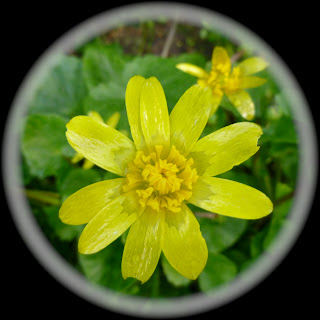The buttercup Family, Ranunculaceae, is an old family of flowering plants. The family includes it's namesake, the buttercups, as well as clematises, hellebores, larkspurs (delphinuims), monkshoods (aconitums), meadow-rues (thalictrums), and devils-in-a-bush (nigellas). There are over 1700 species in this family. One common characteristic is the abundance of their "flower bits." These plants contain protoanemonin, which is a toxic substance that can cause rashes through touch or nausea, vomiting, dizziness, vomiting, or paralysis upon ingestion. Beggars have apparently purposely blistered their skin with buttercups to arouse sympathy from passers-by. Though toxic, meadow buttercups have been picked for generations and held under a friend's chin. The folklore has it that if if reflects yellow light on the chin, the friend likes butter. Many parts of these plants can be found in the fossil record, dating to around 125 mya in the early Cretaceous Period. These are flowers that dinosaurs might recognize, though of course they have been changing in the intervening millions of years. Currently, they are found worldwide, with the major exceptions of African and Australian deserts, and Greenland tundra.
Anemone - Japanese
Anemone - white
Aquilegia - Columbine
Aquilegia - Columbine
Aquilegia - Columbine
Aquilegia caerulea 'Rotstern' - Crimson Star Columbine
Aquilegia caerulea - Rose Queen Columbine
Aquilegia formosa -Western Columbine
Aquilegia vulgaris - Columbine
Caltha palustris - Yellow Marsh Marigold
Clematis 'John Warren'
Clematis 'Pamiat Serdtsa'
Clematis montana 'Peveril'
Hellebore - brown
Helleborus orientalis
Helleborus orientalis
Helleborus - pink
Helleborus x Hybridus 'Ballerina'
Helleborus x Hybridus 'Ballerina'
Nigella
キンポウゲ科、イチリンソウ属、センニンソウ属、オオヒエンソウ属[デルフィニウム]、クリスマスローズ属、クロタネソウ属
キンポウゲ科、イチリンソウ属、センニンソウ属、オオヒエンソウ属[デルフィニウム]、クリスマスローズ属、クロタネソウ属

























No comments:
Post a Comment